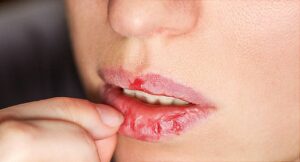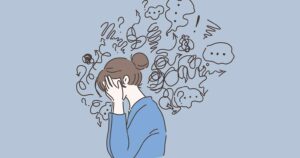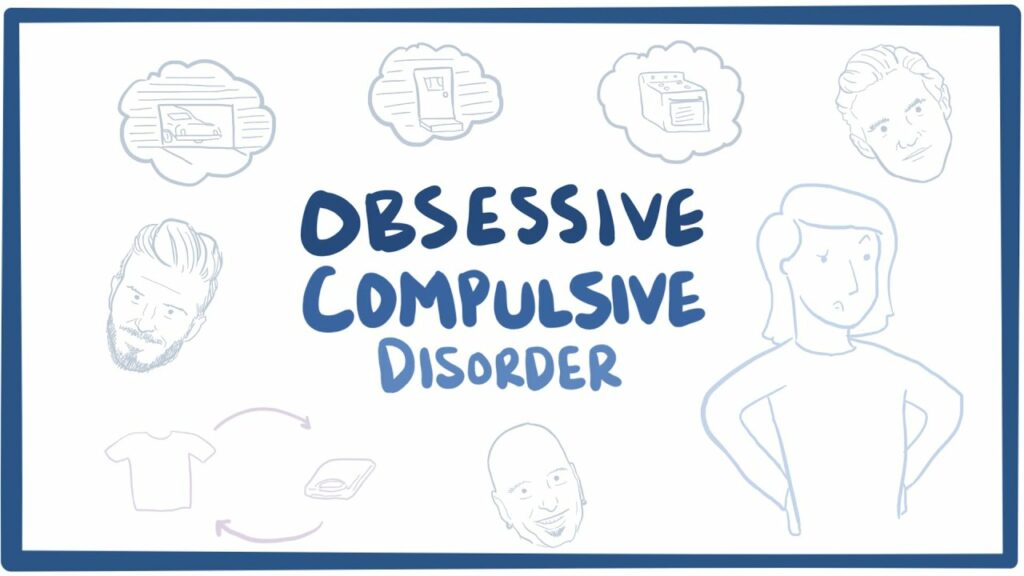Do you sometimes feel like you’re out of control? Like you can’t stop thinking or doing the same things over and over again? If so, you may be dealing with a disorder that is similar to OCD. In this blog post, we will discuss 8 disorders that are similar to OCD and how they can affect your life. We will also provide tips on how to deal with these disorders and improve your quality of life.
Contents
How Many Disorders Are Similar To OCD?
 Many people often worried they might have OCD when in reality, they may just have a case of the blues. So, people need to be aware of those disorders similar to OCD. This eventually leads to people getting the proper help they need.
Many people often worried they might have OCD when in reality, they may just have a case of the blues. So, people need to be aware of those disorders similar to OCD. This eventually leads to people getting the proper help they need.
However, there is one similarity between the mental disorders: they all can significantly affect a person’s quality of life. Therefore, no matter what type of disorder you have, it is always important to seek professional help in order to improve your life.
8 Disorders Similar To OCD
The following is a list of disorders similar to OCD that can significantly affect your life:
Body Dysmorphic Disorder
BDD is a disorder in which a person is extremely obsessed with a perceived flaw in their appearance. This can lead to the person engaging in repetitive and often harmful behaviors, such as skin picking or hair pulling. Just like OCD, BDD is often accompanied by anxiety and depression. It is more often misused and also known for the ‘imagined ugliness.’
In fact, the thought of flaws, people with this disorder tend to have obsessive thoughts about a particular physical feature they believe to be flawed. It can be any of the body parts: Hair, skin, nose, stomach, etc. People with BDD become so obsessed that it starts to interfere with their daily lives.
Symptoms
- Preoccupation with a flaw in appearance that is not observable or appears slight to others
- Repetitive behaviors such as excessive grooming
- Avoidance of social situations due to embarrassment
- Avoidance of mirror to not being triggered by appearance.
- Intense anxiety and distress about appearance
- Depression or thoughts of suicide associated with BDD
- Seeking reassurance about appearance from others
These symptoms of BDD must be present for at least an hour every day. And cause clinically significant distress or impairment in social, occupational, or other important areas of functioning.
It is estimated that BDD affects 0.75-0.91% of the general population, with a lifetime prevalence rate of about 0.69%. It occurs slightly more often in females than males.
Body-Focused Repetitive Behaviors
 This disorder is characterized by repetitive behaviors that focus on sensations or release tension in the body. These repetitive behaviors sound very similar to OCD, but they do not necessarily include obsessions or compulsions.
This disorder is characterized by repetitive behaviors that focus on sensations or release tension in the body. These repetitive behaviors sound very similar to OCD, but they do not necessarily include obsessions or compulsions.
People with this disorder may excessively bite their nails, pick at their skin, pull their hair, or engage in other similar behaviors. These behaviors can cause physical damage to the body and significantly interfere with a person’s life. There are majorly 4 types of this disorder:
- Hair-Pulling Disorder: Also called trichotillomania, this is when a person has an irresistible urge to pull out their hair, resulting in bald patches.
- Skin Picking Disorder: This is when a person feels the urge to pick at their skin, often resulting in scabs or scars.
- Nail Biting Disorder: This is when a person bites their nails excessively, often resulting in damaged nails.
- Mouth Compulsions: It is even possible to have a disorder that specifically involves mouth compulsions, such as lip biting or cheek chewing.
These disorders are often treated with similar methods to OCD, such as therapy and medication. Moreover, there are some common symptoms of BFRBs, disorders similar to OCD.
Symptoms
- feeling like you can’t control the urge to engage in the behavior
- engaging in the behavior for at least an hour every day
- feeling relief, pleasure, or satisfaction after engaging in the behavior
- feeling anxiety, stress, or tension before engaging in the behavior
- having significant problems in your personal life, work-life, or school life because of the behavior.
If you have any of these symptoms, it is important to reach out for help. These disorders can be very distressing and significantly interfere with your life. But there are treatments that can help. Don’t hesitate to talk to a doctor or mental health professional if you think you may have a body-focused repetitive behavior.
Depression
It is a condition that is characterized by persistent sadness and can lead to a number of emotional and physical problems. It can interfere with your ability to work, study, sleep, eat, and enjoy activities that you once enjoyed. Moreover, depression can also lead to thoughts of suicide.
Some of these symptoms are;
- Irritability
- Loss of interest in activities or hobbies
- Changes in appetite or weight
- Sleep disorders
- Fatigue
- Feelings of worthlessness or guilt
- Trouble concentrating
These symptoms of depression can be complex and vary from mild to severe. Moreover, there can be physical symptoms too such as;
- Headaches
- Digestive problems
- Chronic pain
The good news is that depression is treatable. There are a number of effective treatments available, including medication, psychotherapy, and self-care.
Tourette Syndrome
 It is a disorder that comes under the category of disorders similar to OCD. It is characterized by tics which are repetitive muscle movements or vocalizations. The tics can be really mild to severe, and in some cases, they can be disabling. People with Tourette syndrome usually have comorbid conditions such as ADHD or OCD.
It is a disorder that comes under the category of disorders similar to OCD. It is characterized by tics which are repetitive muscle movements or vocalizations. The tics can be really mild to severe, and in some cases, they can be disabling. People with Tourette syndrome usually have comorbid conditions such as ADHD or OCD.
Moreover, Tourette syndrome is also associated with a higher risk of developing depression and anxiety disorders. If you have Tourette syndrome, it is important to seek professional help so that you can manage your symptoms and live a normal life. People with Tourette’s often make repetitive noises or utterances (called coprolalia) that can be vulgar or offensive. There are some of the symptoms that reflect that a person has Tourette syndrome they are as follows:-
Symptoms
- Repetitive blinking
- Clearing the throat
- Sniffing
- Grunting
- Yelling
These symptoms can be really mild to severe and can vary from person to person. If you have any of these symptoms, it is important to seek professional help. Otherwise, it might get worse and can affect your quality of life.
Asperger Syndrome
Asperger is a condition that is considered to be on the autism spectrum. While people with Asperger may not have all of the social deficits that are characteristic of autism, they can still have trouble with social interactions and communication. People with Asperger often obsess over certain interests or topics and can become extremely knowledgeable about these areas. They may also have repetitive behaviors or rituals that they feel compelled to do. While Asperger can be a challenge, there are many successful people with the condition.
But also, there are several negative impacts of this situation that are not often talked about. For example, people with Asperger’s may have a higher risk for anxiety and depression. They may also be more likely to engage in self-destructive behaviors such as substance abuse.
Symptoms
- The trouble with social interactions
- Obsessive interests or topics
- Repetitive behaviors or rituals
- Higher risk for anxiety and depression
- More likely to engage in self-destructive behaviors such as substance abuse.
While there is no cure for Asperger’s, there are treatments that can help lessen the symptoms. These include behavioral therapy, speech therapy, and occupational therapy. Medications can also be used to treat associated conditions such as anxiety or depression.
ADHD
ADHD stands for Attention Deficit Hyperactivity Disorder. It is a mental disorder that is characterized by problems with focus, hyperactivity, and impulsiveness. People with ADHD may have impulsive behaviors (may act without thinking about what the consequences will be). It is estimated that between three and five percent of school-aged children have ADHD.
However, there is no such thing as “normal” brain activity or behavior. So, what separates those with ADHD from OCD and other mental disorders? The answer lies in the severity of symptoms and how they interfere with a person’s life.
For example, people with OCD may be so consumed by their obsessions and compulsions that they are unable to function in day-to-day life. On the other hand, people with ADHD may be able to function fairly well but still have difficulty paying attention or controlling impulsive behaviors. Some of the signs;
- Trouble focusing or paying attention
- Being easily distracted
- Hyperactivity
- Impulsiveness
The symptoms of ADHD can vary from person to person and may change over time. For some people, the symptoms may go away or become less severe as they get older.
Bipolar Disorder
Bipolar disorder is a mental disorder that is characterized by episodes of mania and depression. This is often a condition where people experience extreme changes in mood. People with bipolar disorder often have difficulty maintaining stable relationships and jobs. Bipolar is commonly similar to OCD in terms of its effects on a person’s life.
Moreover, it is believed that those with OCD are more likely to develop bipolar disorder. This is due to the fact that both conditions share similar symptoms. For example, people with bipolar disorder often have periods of hyperactivity and impulsivity, which can be similar to the obsessions seen in OCD.
Symptoms
- Excessive talking
- The decreased need for sleep
- Unusual irritability
- Grandiose thinking
- Racing thoughts
- Increased sexual drive
If you or someone you know is displaying these symptoms, it is important to seek professional help. Bipolar disorder can be a very debilitating condition if left untreated. However, there are many effective treatments available that can help people manage their symptoms and live happy, productive lives.
Anxiety Disorders
 Anxiety disorders are another type of mental disorder that share similarities with OCD. These are characterized by feelings of excessive anxiety and fear. People with anxiety disorders often have difficulty completing everyday tasks due to their constant worry and stress.
Anxiety disorders are another type of mental disorder that share similarities with OCD. These are characterized by feelings of excessive anxiety and fear. People with anxiety disorders often have difficulty completing everyday tasks due to their constant worry and stress.
Like OCD, anxiety disorders can also be treated with medication and therapy. If you think you may be suffering from an anxiety disorder, it is important to speak to a mental health professional. There are some of the signs that are associated with anxiety disorders.
Symptoms
- Excessive worry and stress
- Difficulty completing everyday tasks
- Avoidance of certain activities or situations
- Trouble sleeping
- Irritability
If you are experiencing any of these symptoms, it is important to reach out for help. There are many resources available to people suffering from mental disorders. With the right treatment, it is possible to live a happy and healthy life. If you think you may be suffering from OCD or an anxiety disorder, please reach out for help.
How Are These Disorders Similar To OCD Affect Life?
These disorders similar to OCD can make life very difficult. For example, someone who has Asperger’s may not be able to understand social cues. This can make it hard to make friends or keep a job. People with Tourette’s syndrome may constantly feel the need to move their bodies or say certain words. This can make it hard to focus at school or work.
Moreover, there are some common consequences that these disorders can have on people’s lives. Some of these impacts are as follows;
Isolation
It is the commonest impact of these disorders. It is because people with these disorders find it hard to mix up with others in society. They become isolated and this leads to several other psychological problems. Moreover, those disorders similar to OCD that are not identified and remain untreated also lead to isolation.
Loss of Productivity
These disorders can also lead to a loss of productivity. For example, someone with Tourette’s may have a hard time keeping a job because they can’t stop moving or saying certain words. People with Asperger’s may also have a hard time keeping a job because they can’t understand social cues.
Unemployment
These disorders make it hard for people to keep a job or get one in the first place. The symptoms of these disorders can interfere with work performance. For example, someone with Tourette’s may have a hard time keeping a job if they are constantly making noises or moving their body.
Poor School Performance
Similarly, these disorders can also make it hard to do well in school. The symptoms can interfere with concentration and learning. As a result, many people with these disorders drop out of school or end up getting lower grades than they are capable of. Moreover, this lack of education can make it harder to get a job later in life. And even, make it difficult for children to make friends at school.
Low self-esteem
This often goes hand in hand with isolation. When someone is isolated and not doing well in school or work, it can lead to low self-esteem. People with these disorders may start to believe that they are not good enough or that they do not deserve to be successful. In fact, low self-esteem is one of the main reasons why people with these disorders do not seek treatment. They may not believe that treatment will help them.
These five negative impacts are the commonest in people with disorders similar to OCD. This is why it is important to seek help if you or someone you know is suffering from one of these disorders. Early diagnosis and treatment can make a big difference in the long run. Otherwise, these conditions can lead to a downward spiral that is hard to break out of.
How To Get Help For Those Disorders Similar To OCD?
 It might be difficult for you to tell whether your behaviors are due to OCD or another mental health disorder. If you have any concerns, it’s important to reach out to a professional for help. Here are some ways to get started:
It might be difficult for you to tell whether your behaviors are due to OCD or another mental health disorder. If you have any concerns, it’s important to reach out to a professional for help. Here are some ways to get started:
Talk to someone who understands
It is the primary step to getting help for OCD or any other mental health disorder. Talk to your friends, family, therapist, doctor, or any other support system you have. Moreover, family and friends are of great help in OCD treatment. As it is important to find someone who understands what you are dealing with and can offer support and guidance. If you do not have anyone in your life who understands, there are many online communities that can offer support.
Reach out to a therapist
Therapists are trained to help people with OCD and other mental health disorders. They can help you understand your thoughts and feelings and develop coping mechanisms. If you do not have a therapist, you can find one through Mantra Care, an online platform that connects you with mental health professionals. However, the most preferred therapies are; CBT and ERP. These both work best for treating OCD. Book your free consultation today to learn more about it.
Join a support group
Support groups provide a space for people with OCD and other mental disorders to share their experiences and offer support to one another. There are many online and in-person support groups available. To find a group near you, search “OCD support group” on Google or you can also join our online OCD support group.
Practice healthy coping mechanisms
It is important to find healthy ways to cope with your thoughts and feelings. Some healthy coping mechanisms include;
- exercise,
- journaling,
- relaxation techniques,
- mindfulness, and
- spending time in nature.
By following these healthy ways, you can ease your anxiety and feel better.
Be patient and consistent
 It is always advised that you be patient in the process of healing. As it takes time to develop new coping mechanisms and see improvement. Be consistent with your treatment plan and do not give up if you don’t see results immediately. Remember, you are not alone in this journey. There are people who understand what you’re going through and can offer support and guidance.
It is always advised that you be patient in the process of healing. As it takes time to develop new coping mechanisms and see improvement. Be consistent with your treatment plan and do not give up if you don’t see results immediately. Remember, you are not alone in this journey. There are people who understand what you’re going through and can offer support and guidance.
So, here are some of the ways that can help you in getting rid of OCD or any other mental health disorder. If you or anyone you know is struggling with OCD, don’t hesitate to reach out for help. We’re here to support you every step of the way.
Mantra Care provides evidence-based treatment for OCD and other mental disorders. Book your free consultation today!
Conclusion
To conclude, disorders similar to OCD can be very debilitating and have a significant impact on your quality of life. This can make it difficult to function in day-to-day life and can cause a great deal of distress. These disorders can be treated with medication, therapy, or a combination of both. If you think you may have a disorder similar to OCD, it is important to seek professional help.
If you are looking for affordable Online OCD Counseling MantraCare can help: Book a trial OCD therapy session


